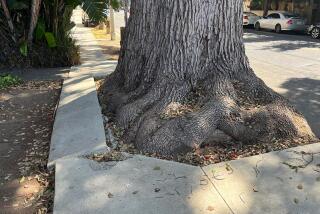L.A. announces plan to reduce backlog of unexamined DNA evidence from violent crimes
- Share via
Top city officials Tuesday unveiled a plan to help the Los Angeles Police Department’s crime lab reduce its massive backlog of unexamined DNA evidence from violent crimes, but they acknowledged that the funding for the proposal was less than certain.
Under the terms of the plan, which the City Council is expected to vote on today, the LAPD would allocate $700,000 to hire 16 more DNA analysts and support staff -- a boost of about 33% over current staffing. The city would also increase by $250,000 the funds earmarked to pay private laboratories that the LAPD hires to help with the daunting workload.
“Our fundamental duty as elected officials is to ensure the safety and well-being of each of our residents,” Mayor Antonio Villaraigosa said at a late afternoon news conference attended by Police Chief William J. Bratton and City Council members. “When crimes are committed, particularly the heinous crimes of rape -- we have a solemn obligation to seek justice.”
Despite the rhetoric, however, the proposal is not a panacea and does not guarantee that the LAPD will have the funds it needs to process the entire backlog of roughly 7,000 cases, authorities acknowledged. Even if approved, the plan would still fall about $900,000 short of what is needed to keep pace with new crimes and meet the LAPD’s goal of clearing about 2,500 of the older cases this year. Also, at least $4.2 million in additional funds would be needed in coming years to fill 20 more analyst positions and continue the contracts with outside labs. LAPD and city officials expressed hope that the shortfall could be made up from private donations and increased federal funding.
“I hope the political commitment being made here today continues in the next several years,” Bratton said. Then, referring to Councilman Jack Weiss, he added: “As Mr. Weiss has also pointed out, this is not a one-time fix.” Weiss has long fought for increased funding for DNA analysis and spearheaded the city’s current proposal.
The hastily arranged news conference was the culmination of several months of mounting concern for the mayor, Bratton and top advisors as the LAPD came under increasing criticism for its efforts to reduce the backlog. In August, The Times reported that bookkeeping mistakes had resulted in the LAPD losing nearly $500,000 in federal grant money earmarked for DNA analysis. And, last week, City Controller Laura Chick released an audit of the DNA lab, which found that 200 potential sex crime cases have not been prosecuted because Los Angeles police officials failed to meet legal deadlines to test DNA evidence.
Rapes, homicides and other violent crimes have fallen dramatically in the six years since Bratton took over the department. With too few DNA analysts on staff and too little funding for outsourcing, however, department officials have said they were helpless to eliminate the backlog.
In a tight budget, the funding for the DNA analysts would come at a cost for the LAPD: It would forgo filling some other civilian positions this year. The additional outsourcing funds were expected to come from a pool of healthcare money turned over to the city by a coalition of unions as part of a cost-saving agreement reached earlier in the year.
At its best, DNA analysis provides detectives investigating violent or property crimes with nearly airtight evidence to link a suspect to a crime. The DNA contained in semen collected after a rape, for example, can be examined through an elaborate process to produce a genetic profile of the rapist.
The most pressing cases for the LAPD are the roughly 520 cases of sexual assault, homicide and other crimes in which detectives have requested DNA analysis to help in their investigation, but have had to wait because of the lab’s limited resources. The remainder of the backlog -- evidence from about 6,600 alleged sex crimes -- is from cases in which the detectives have not yet requested DNA analysis. It is unknown how many of those cases have already been resolved and how many might benefit from an examination of the genetic evidence. Regardless, LAPD officials, like officials in other law enforcement agencies facing similar problems, have said they want to analyze the DNA evidence from all the cases.
Sarah Tofte, a researcher for Human Rights Watch, which has drawn attention to DNA backlog issues in law enforcement agencies around the country, raised concerns about whether the LAPD had “a comprehensive plan” in place that was needed to take advantage of the increased funding. Tofte said the LAPD would have to make a commitment similar to the one made by the New York Police Department, which assigned extra detectives to work on nothing but backlogged cases.
“Getting rid of the backlog won’t mean anything to rape victims unless it translates into more investigations of rape cases, and more arrests, prosecutions and convictions,” she said. “This is like someone trying to build a house without any blueprints.”
Rubin and Winton are Times staff writers.
More to Read
Sign up for Essential California
The most important California stories and recommendations in your inbox every morning.
You may occasionally receive promotional content from the Los Angeles Times.












